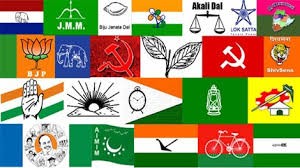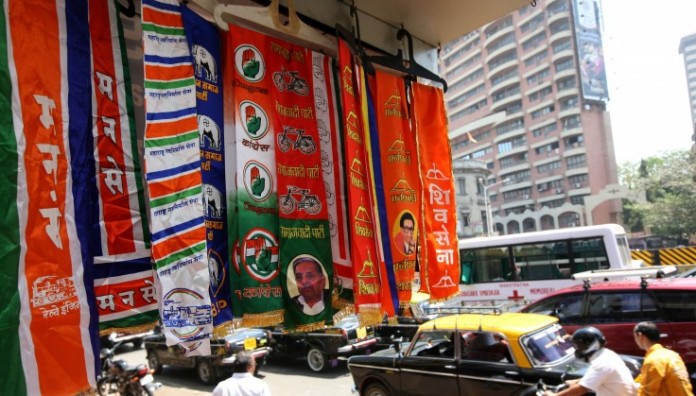In this blog post, Rishabh, a student of Guru Gobind Singh Indraprastha University, New Delhi and pursuing the Company Secretary Course by ICSI, discusses funding of political parties in India.
Introduction
Every political party, whether big or small needs to ‘sell’ to the people, why they should vote for their party. Achieving without proper execution of planned advertisements can be hard. The question of funding arises with a motive to financially back up the advertisement costs and other miscellaneous costs incurred by the party to promote itself. We shall, in this article, analyse the funding of political parties in India.
How can a political party be funded
There are various methods of getting a political party funded. Most popular methods of funding of political parties, however, are funding by Individual Person, Public Funding and Corporate Funding.
A political party may also acquire funds by ways which are criticised, but not illegal, such as donation by people during rallies, relief funds, the sale of coupons and other miscellaneous fundings.
Public Funding or State Funding
State funding or public funding is where the government provides funds to the political parties for election-related purposes. The basic motive behind the state funding is to allow a political party to gather funds without approaching companies or people holding money as it often leads to such contributors having influence over the political parties they fund. Also, state funding helps save the high amount wasted in election campaigns and provides fair opportunities to political parties having limited sources funding them.
 State Funding can be of two types:
State Funding can be of two types:
- Direct Funding: giving direct funds to political parties.
- Indirect Funding: other methods except direct funding, such as free access to media, free access to public places for rallies, free or subsidised transport facilities, etc. fall under the category of indirect funding.
Direct funding by the state is prohibited in India. However, indirect funding is allowed in a regulated manner. Some examples of indirect funding in India to the political parties are providing free access, for campaigning, of state-owned television and radio network, free electoral rolls, income tax exemption under Section 13A of the Income Tax Act, 1961(hereinafter the IT ACT), etc.
Corporate Funding
Corporate Funding corresponds to the funding of the political parties by Corporate bodies in India. It has been observed that most of the donations to political parties are made by companies. In the year 2013-2014, 90% of the funds of political parties came from big corporates in the countries.
Donation by corporate bodies is governed by the Companies Act, 2013. Section 182 of the Act provides that:
- a company needs to be at least three years old since the date of its existence to be able to donate to a political party,
- companies can donate a maximum of 7.5% of the average net profits they made during three immediately preceding financial years,
- such contribution must be disclosed in the profits and loss accounts of the companies,
- no contribution shall be made without obtaining the approval of the board of directors by passing a resolution,
- if a company contravenes the provisions of this section, it may be held liable to a pay fine which may extend up to five times the amount contributed in default and every officer guilty of such contravention may be imprisoned for a term which may extend to six months and with fine which may extend up to five times the amount contributed in default.
As evident, corporate funding is a major player in the election campaigns in India. It is a matter of common sense that no company would fund a political party without any personal interest. The more the funding, the more influence the company has over the party. It is for this, corporate funding is criticised, and many-a-times has been debated over to be banned.
One of the biggest problems in corporate funding is the use of fake companies to flush the black money as donations. It can be prevented if proper scrutiny of all the companies is done regarding their incorporation documents and data available on the website of the registrar of the companies regarding the company in question, verifying PAN details of the company, verifying credit score of the company, etc.
Electoral Trusts in India
Electoral Trust is a non-profit company established to receive voluntary funds subject to Section 29B of the Representatives of People’s Act, 1951 (hereinafter RPA) and donate the same to the political parties (Rule 17CA of Income-tax Rules, 1962). It is prohibited for the electoral trust to carry on any other kind of business. Also, one trust can not donate to another trust. It is a must for an electoral trust to have “electoral trust” in its name. It is currently provided for by the Companies Act 2013 and Electoral Trusts Scheme, 2013 as notified by the Central Board of Direct Taxes on 31st January 2013.
The electoral trust must donate at least 95% of the contributions acquired to the political parties for campaigning. If it fails to do so, it shall not be exempted from paying income tax. On payment of the said percentage to political parties, it is not required to pay income tax on the donations as provided under Section 13B of the IT Act.
The contributions received and donated by the electoral trusts are very transparent. This along with the tax benefits are the main reasons for appraisal of the concept of electoral trusts. Some examples of the companies having electoral trusts are Reliance Group, Vedanta Group, Bharti Group, etc.
Statutory Provisions Allowing Political Parties to Accept Funds
The primary statutory provision regarding funding of political parties is in the RPA:
- Section 29B of the RPA entitles the political parties to accept voluntary contributions made to them by any person or a company except a government company.
Statutory Provisions Checking and Restricting Donations
The rivalry between political parties in India is aggressive, and it is not a matter of shock that immoral methods are adopted by certain parties to acquire funds. It includes funding through fake companies, funding through black money and other methods. In order to regulate the fundings, certain provisions are present in different acts in India. Apart from the provisions regulating corporate funding mentioned above, some other provisions are:
- Section 29C of the RPA mandates it for the political parties to declare donations received by them from any person or company if such donation by the person or the company exceeds Rs.20,000. Such declaration is to be made by making a report in each financial year and submitting it to the Election Commission. Failing to submit the report on time disentitles the party from tax relief under the Income Tax Act, 1961.
- As per Section 2(e) of the Foreign Contribution Regulation Act, 1976, accepting a contribution from any foreign source is completely prohibited. It is punishable with imprisonment which may extend up to five years or fine or both. Such political party or political representative may lose a seat and be prohibited from participating in elections for a period which may extend up to six years.
Limits on Expenditures by Political Parties
The maximum expenditure by a political party in an election is governed by Rule 90 of the Conduct of Elections Rules, 1961. Earlier, the limit set was considered to be lower than necessary. In fact, experts were of the view that the lower limits invite under-reporting of the actual expenses incurred, leading to dishonesty in one of the very fundamental steps of the democracy of India, i.e. elections. After the amendment done in the year 2014, the limits set by the new rule are:
- The maximum limit of election expenses in the Parliamentary constituency is Rs.70,00,000/- for all the states except Arunachal Pradesh, Goa and Sikkim, for which the maximum limit is Rs.54,00,000/-. For Union Territories, the maximum limit is set at Rs.54,00,000/- except Delhi, the maximum limit for which is Rs.70,00,000/-.
- The maximum limit of election expenses in Assembly constituency varies from Rs.20,00,000/- to Rs.28,00,000/- in varies states and UTs wherever applicable.
Section 77 of the RPA further clarifies as to what comes under the purview of ‘expenditures of the party’. The expenditures by a political party include all expenditures incurred by the candidate of such party or his authorised agent in connection with the election since the date of his nomination till the date the result is declared. An account shall be maintained of such expenditures by the candidate himself or his authorised agent.
Lack of Transparency in Funding
As per the report of the Law Commission of India in 1999, democracy and accountability must apply to and bind the political parties in India, as they are integral to the parliamentary democracy. However, the rules regarding funding of political parties in India are flawed.
By the virtue of Section 29C of the RPA, political parties are not required to disclose the name of the person or company making donations to them if such donation does not exceed Rs.20,000/-. This enables political parties to break up the donations from various questionable sources into parts not exceeding Rs.20,000/- and therefore escape from the obligation of disclosing the names.
Examples of Misuse of Lack of Transparency
The majority of political parties in India are accused of under-reporting the actual costs incurred by them for electoral campaigns and various sources facilitating such funds.
- In the year 2013-2014 Bahujan Samaj Party declared to the Election Commission of India that it did not receive even a single donation above Rs.20,000/- and hence was not required to disclose the names of sources of donations.

- In a report of Association of Democratic Reforms and National Elections Watch for the year 2004-2005 and 2011-2012, a large amount of donations of Congress (I), BJP, BSP, NCP, CPI and CPI (M) came from ‘unknown sources’ as mentioned by them in the disclosure statement submitted to the Election Commission of India. Such sources were not disclosed on account of them making donations below Rs.20,000/-.
Methods to Make the Funding of Political Parties More Fair and Transparent
- Ban corporate funding: Funding of political parties by big corporations has always been a matter of criticism. The huge donations made by corporations buys them influence over the political parties and hence puts democracy in jeopardy. Bombay High Court in the year 1957 had warned India with its statement “it is our duty to draw the attention of Parliament to the great danger inherent in permitting companies to make contributions to the funds of political parties. It is a danger which may grow apace and which may ultimately overwhelm and even throttle democracy in this country.”[1] The Calcutta High Court had also warned that corporate funding would mark the advent and entry of the voice of the big business in politics and in the political life of the country[2]. However, despite all the warnings, the parliament after banning the contribution by corporate bodies to political parties in 1969, amended S.293A of the Companies Act, 1956 again and Board of Directors of companies were yet again allowed to make donations to political parties, unfortunately, with more ease than earlier. Currently, S.182 of the Companies Act, 2013 regulates corporate funding.

- State funding: Once corporate funding is banned, state funding may be needed to be provided to the political parties to help them raise funds. Moreover, state funding can become a tool to help curb the trend of donating black money to political parties. However, as per the Election Commission, it is not the right time for India to introduce direct state funding. According to Chief Election Commissioner, Nasim Zaidi[3], it shall only be appropriate to introduce state fundings if it is followed by some radical reforms such as:
- de-criminalisation of politics in a democracy in parties,
- holistic electoral finance reforms,
- robust transparency and audit,
- a strict legal regime for enforcement of anti-corruption laws
- RTI: If all political parties are brought under the scope of the Right to Information Act, 2005, and their funding is disclosed, whether below Rs.20,000/- or above if an RTI application is filed regarding the same, it will help make the funding of political parties more transparent. This idea is hugely opposed by the majority of the political parties.
Conclusion
As much as funding is necessary for political parties to acquaint people of the party and its ideology, the degree of competition in India is so high it often leads to astonishingly high expenses incurred in electoral campaigns which ‘creates a high degree of compulsion for corruption in the public arena’[4]. Laws and policies in India are still in the ‘development stage’ regarding curbing efficiently, the funding of political parties, without prejudicing the right of political parties to promote themselves.
References:
[1] Jayantilal Ranchchoddas Koticha vs. Tata Iron & Steel Co. Ltd. 1957 27 Comp Cas 604 Bom
[2] Indian Iron and Steel Co. Ltd., In re [1957] 27 Comp Cas 361, 364 (Cal)
[3] Not the right time to have state funding of polls in India: Election Commission, Economic Times, December 15, 2015 available at http://articles.economictimes.indiatimes.com/2015-12-15/news/69061949_1_political-parties-state-funding-parties-and-candidates (last visited on December 22, 2016)
[4] Chapter 4 of the Report of the National Commission to Review the Working of the Constitution, 2001
 Serato DJ Crack 2025Serato DJ PRO Crack
Serato DJ Crack 2025Serato DJ PRO Crack









 Allow notifications
Allow notifications


